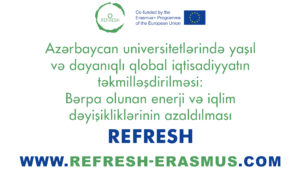Nature is the sweetest, most mysterious and magical epic, fairy tale. When you wake up every day, listening to the unique symphony of nature, watching the fascinating beauties that shake the inner world of a person is an irreplaceable share of God. The greatest advantage of nature over man is that it does not go a step beyond what God has commanded. Proportion and unity in nature is also enviable. Then you realize that there is no randomness in God’s creation.
Man is a part of nature. Nature feeds us with its resources, keeps us alive, develops the physical and spiritual forces of Man, gives us life. Nature is an inexhaustible treasure, first of all, a treasure of spirituality. Unless you turn your back on him, he will not leave you alone in the livelihood of your life. If you can reach the level of perfect love in your friendship with nature, you will be able to conquer the Fizuli peak in life and in love, you will be able to reach this height not only in relation to people, but also in relation to all the things created by God. If you can adequately “water” the seeds that nature will sow in your soul and heart, your goals and intentions will become oceans , and your contributions to humanity will be sorted out. Nature will add luck to your destiny. If you can reach the power to penetrate the spirit of nature, you will discover the spiritual world more fully, thus mastering the key to a happy and meaningful life.
In the history of our poetry, depictions of nature serve as a grand chronicle. The essence of many works is adorned with nature, while their foundation is composed of national and universal reflections. Overall, enchanting nature is a pure image. Nature is the artist’s companion in love; the artist seeks to dominate it, yet unknowingly becomes its captive. They dedicate poems, compose songs—in short, they sanctify nature. Thus, nature, with its beauty, grandeur, and freshness, connects the soul and style of artistic works to time, era, circumstances, and, especially, the personal emotions of the author. It is portrayed in a manner characteristic of the artist’s worldview and imagination.
Our world-famous poet Nizami Ganjavi, who tirelessly glorifies the natural beauty of Azerbaijan, is one of the most beloved geniuses of all times. Today we are still benefiting from the spiritual wealth inherited by this great personality, who has exalted himself in the name of our people. As someone reads his works, in the reader’s mind, Nizami comes to life in another image – as a biologist who perfectly knows the laws of nature, analyzes biological processes taking place in nature. According to the poet’s teaching, people are also part of nature. All members of nature have their own specific task. Everyone is obliged to carry out this task properly. And by duties we mean observing the purity of nature, the surrounding world, not polluting, instilling care, care and love for living beings, animals, flowers, plants, trees.
In almost all his works, Nizami Ganjavi tried to educate people in the spirit of loving nature and nurturing a caring attitude towards it. In his ideas about environmental education, it was suggested that man should preserve his sublimity, save nature from destruction. The wise verses of the great poet still today lead to the emergence of a humanistic attitude to living nature in the direction of the formation of an ecological worldview in the younger generation and make them think:
Mercy to the land is good, believe,
If you grace, it will give flowers, if you oppress, thorns.
The poet tries to explain to a person that every living being, like you, is alive, valuable, has its own value in nature, do not try to destroy any living being. He calls on people to enjoy the beauties of nature and life and not to destroy nature. Standing to the calls of our great poet, today’s teachers, together with their children, pupils and students, participate in tree planting actions, plant flowers in the school area, take care of planted plants, both form good feelings in children (students) and instill labor in nature.
The research proves once again that Nizami Ganjavi, a great natural scientist, humanist-educator, in almost all his works tried to educate people in the spirit of loving nature and nurturing it with a caring attitude. In his ideas about environmental education, it was suggested that man should preserve his sublimity, save nature from destruction.
Integrating the works of the genius Nizami in the teaching of natural sciences, introducing the living and non-living world, voicing the poet’s ideas about living and inanimate nature, explaining the laws of nature, patriotism, kindness, kindness, following tasks, cleanliness, determination, truthfulness, friendship, companionship. formation of spiritual and moral qualities will arouse the interest of students, which will be very beneficial in mastering the subjects. Therefore, important attention should be paid to the education of these qualities in the training process. It is possible to better achieve the formation of these types of education in students by using the examples of aesthetic, ecological, labor, and moral education in the poet’s works.
The training process should be organized in such a way that environmental education can be effectively implemented in these conditions. Therefore, important attention should be paid to the training of these qualities in the training process. While teaching different topics during the training, the main task should be the education of children in nature protection. For this, first of all, a topic of special importance for environmental education should be chosen.
Practice shows that in nature, Labor is of great importance for the mental and sensory education of children. For this purpose, educators widely use the observation method on the excursion. During the organization of such observations, students are given detailed information about plants and animals, animate and inanimate nature, natural phenomena, the work of people in nature, as well as the dependence and cause-and-effect relationships between objects and phenomena. We must create conditions so that they can observe the diversity of nature’s blessings, the processes of its emergence and development in nature.
Each of us should more deeply master the literary and pedagogical heritage left to us by Nizami Ganjavi, one of the most precious pearls of our spiritual treasure, and instill it in our students and students bearing the title of teacher in the future. This is our moral duty
Rahila Mammadova,
Head teacher of the Department of Humanitarian Disciplines of MSU, Ph.D.





